May 6-8, 2021, the Tenth Annual RefoRC Conference on Early Modern Christianity will take place in Budapest, hosted by the Research Centre for the Humanities.

Introduction
The concept of Long Reformation has entered the terminology of Reformation historiography during the 1990s. Since its very first mention it has been employed to describe novel approaches to Reformation history, or to re-evaluate some of the findings of the scholarship. This conference seeks to reflect upon Long Reformation not only as a tool of historical periodization, but as a possibility to revisit those cultural, social, and theological issues that had been shaping Reformation from 1400 to 1800 all over Europe. It intends to reiterate the conviction that Reformation was not an abrupt change, but an era of multifaceted transfers, translations, and complex transformations.
Thus this conference aims to explore three major thematic perspectives in the plenary lectures:
1. Long Reformation and Historical Writing
Long Reformation as a critical tool assessing the historical writing of Reformation would provide new perspectives regarding the making of Reformation as an era on both macro and micro-levels. Papers critically reflecting on the relation between Early Modern Christianity and Reformation(s) with all their historiographic implications are in particular welcome.
2. Social History and the Benefits of Long Reformation
The significance of Long Reformation consists in changing the scale of analysis as it adds some 150 years to the period of Reformation. Thus certain social and cultural processes of transformation originating from Reformation, but unavoidably brought to a close by 1650s could be revisited and evaluated in the context of a longer period of time.
3. Mutimediality and Fine Arts
Long Reformation (1400–1800) implies unavoidably the reformation and transformation of medieval and early modern media not only as technologies but means to create literary texts, work of arts and music. Thus, experts of early modern art history and musicology are encouraged to contribute with papers reflecting on multiconfessional devotion expressed in contemporary works of art and musical culture.
Research Project
This conference is part of the research agenda of the Long Reformation in Eastern Europe (1500–1800) research project supported by HAS and RefoRC.
Topic Plenary Lectures
Long Reformation (ca. 1400–1800): Confessions, Cultures, and Societies.
Plenary speakers are Gabriella Gilány (Budapest), James Kelly (Durham), Erica Kiss (Budapest), Volker Leppin (Tübingen), Alec Ryrie (Durham), Zsombor Tóth (Budapest), and Anna Vind (Copenhagen).
Short Papers, Panels, and General Attendance
The conference is open to individual short paper presentations (20-minute presentations) and to thematic sessions of two or three short papers. While we encourage papers on the conference theme, papers can also focus on all disciplines related to Early Modern Christianity, ca. 1450-1650, such as philosophy, law, history, theology, etc., independent of the theme of the plenary papers.
Your proposal will be reviewed by the organizers and you will be notified of the outcome within two weeks following the receipt of your proposal.
It is also possible to attend the conference without giving a paper.
Registration/Registration Fee
Registration becomes effective on receipt of payment of the registration fee. If your short paper proposal has been accepted, please see to it that the amount of the registration fee is on our account before March 1, 2021, so that we can include your paper in the program. Registration closes on May 5, 2021.
Hybrid Event
The Tenth Annual RefoRC conference planned for May 6-8, 2021 in Budapest will be a hybrid event: it can be attended both in-person and virtually. You can indicate your preference in the registration form. If you have already registered, we will ask you about your preference.
Coronavirus Updates
Regular updates concerning the Coronavirus in Hungary can be read on this official website of the Hungarian government.
Language
The language of the conference is English, papers in French and German will also be welcomed. Presenters who prefer to give their paper in French or German are invited to provide the audience with an English summary of about 150-200 words.
Conference Proceedings
The conference volume will be published by Vandenhoeck & Ruprecht in the series Refo500 Academic Studies (R5AS) and will contain all the plenary papers and a selection of short papers. Another publication venue is the Journal of Early Modern Christianity (JEMC).
Manuscripts for the conference volume can be submitted to the editor Zsombor Tóth. All other manuscripts can be submitted to editor-in-chief of the JEMC, Wim François.
Editors will decide on publication.
More information: reforc.com
Tenth Annual REFORC Conference on Early Modern Christianity – booklet
Visual: Reproduction: Wien Museum, Peter and Birgit Kainz, Allegorie auf das Toleranzpatent Josephs II. vom 13. Oktober 1781


